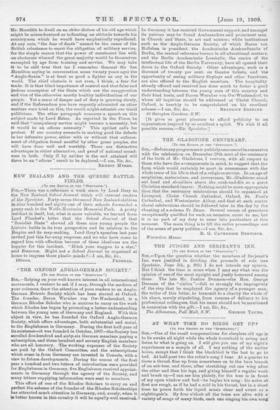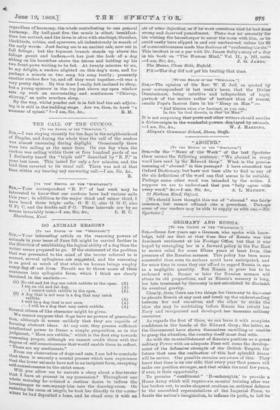AT WHAT TIME DO BIRDS GET UP P [TO VTR
EDITOR OP TRU "SPECTATOR:) SIR,—One of the small compensations for sleepless old age is to lie awake all night while the whole household is asleep and listen to what is going on. I will give you one of my night's experiences as a sample of all. .I say nothing of the earlier hours, except that I think the blackbird is the last to ;go to bed. At half-past two the robin's song I hear. At a quarter to three a thrush flies up from somewhere on to the bare branch of an ash-tree, and there, after stretching out one wing after the other and then his legs, and giving himself a regular wash and brush up—I can see him plainly, for the tree is in front of my open window arid bed—he begins his song: his notes at first are rough, as if he had a cold in his throat, but in a short time he pours forth his liquid music clear and sweet as a nightingale's. By four o'clock all the trees are alive with a' variety of songs of many birds, each one singing his own song
regardless of harmony, the whole contributing to one general harmony. y By half-past five the music is silent, breakfast- time has arrived, and the lawn is alive with starlings, thrushes, blackbirds, robins, and sparrows, all industriously in searoh of the early worm.. Just facing me is an ancient oak, now out in full foliage; but the topmost branch stands up above the foliage gaunt and leafless,---it has just the look of a dog sitting on his haunches above the leaves and holding np' his two front-paws waiting to be fed. At twenty minutes to six, to my delight, a, cuckoo alighted on this dog's nose, and for perhaps a minute or two sang his song lustily ; presently another cuckoo flew by and off they went together,—it was a very pretty sight. By this time I really felt inclined to sleep, but a young sparrow in the ivy just above my open window sets up such an excruciating and continuous "Chirrup, chirrup," as quite murders sleep. By the way, whilst yonder oak is in full leaf the ash adjoin- ing it is still in the budding stage. Are we, then, to have "a Bummer of splash" P-1 am, Sir, &o., E. M.











































 Previous page
Previous page